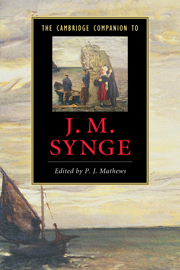10 - Postcolonial Synge
from Part II - Theorising Synge
Published online by Cambridge University Press: 28 March 2010
Summary
The declaration by W. B. Yeats that Synge 'seemed by nature unfitted to think a political thought' and 'long understood nothing . . . of the political thoughts of men' for many years went unquestioned by scholars, producers and audiences. Appearing in an essay originally intended as a Preface for Synge's Collected Works but withdrawn when Yeats lost the battle to prevent the inclusion of Synge's 'Connemara' articles, Yeats's statement reflects his own withdrawal from a particular kind of nationalist politics rather than Synge's. It can also be seen as an attempt to counterbalance the political emphasis generated by Irish nationalist reactions to The Shadow of the Glen and The Playboy of the Western World. Jack B. Yeats, who accompanied Synge on his tour of Connemara, described him as 'an ardent Home Ruler and Nationalist'. Synge's series of twelve articles on Connemara published in the Manchester Guardian in 1905 make Synge's socialist and anti-colonialist politics unmistakable. In the final article ('Possible Remedies'), after suggesting various economic and social reforms, Synge concludes: “Most Irish politicians scorn all merely economic or agricultural reforms . . . if Home Rule would not of itself make a national life it would do more to make such a life possible than half a million creameries. With renewed life in the country many changes of the methods of government, and the holding of property, would inevitably take place, which would tend to make life less difficult even in the bad years and in the worst districts of Mayo and Connemara.” (CW II, 341-3)
- Type
- Chapter
- Information
- The Cambridge Companion to J. M. Synge , pp. 117 - 131Publisher: Cambridge University PressPrint publication year: 2009
- 1
- Cited by

